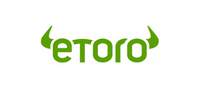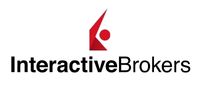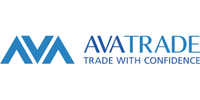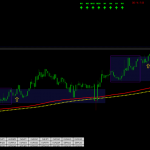This content represents the writer’s opinions and research and is not intended to be taken as financial advice. The information presented is general in nature and may not meet the specific needs of any individual or entity. It is not intended to be relied upon as a professional or financial decision-making tool.
Day trading is a particular strategy used by traders who want to avoid certain risks related to keeping long-term open positions.
When choosing the best broker for day trading, the one that better fits your trading goals, it is important to consider some key elements that are strictly related to this particular trading strategy.
In this article, we will discuss day trading and review the online brokers that can give traders the opportunity to use this strategy.
Top Day Trading Platforms 2023
Here you will find a list of the brokers we’re going to analyze. There’s also a short description, but keep reading to know all the details!
- eToro – Best Overall
- Markets.com – Best for fast transactions
- Interactive Brokers – Best for variety of financial instruments
- AvaTrade – Best for payment methods
1. eToro – Best Overall
eToro is one of the best brokers for day traders because of the variety of instruments available, its low costs and the intuitiveness of its platforms – both online and mobile.
The mix of low costs, intuitiveness and availability of type of orders and financial instruments favors day traders in many ways: they can open different positions fast, automate their activity thanks to orders that automatically close the positions, use diversification as a means of risk management, and all this while brnrfiting from low to zero commissions.
The broker offers intuitive order pages, where traders and investors can choose to set orders with varying levels of complexity: they can decide to choose market or limit orders, to set leverage, and to add levels of complexity through the stop-loss and take-profit functionalities – that can also partially automate the activity of traders and investors.
The platform also offers different payment methods – some of them, like digital wallets and eToro Money, allow for instant transactions.
- Low cost broker
- Intuitive platform and design
- Large availability of financial instruments
- eToro doesn’t allow specific strategies often used by day traders, like scalping
- It might be complex for traders and investors to easily calculate costs, since the broker use market spread
- More advanced types of orders are not available
2. Markets.com – Best for fast transactions
Markets.com is one of the most appreciated brokers by beginners and traders who want to focus on fast transactions. Fast transactions are one of the most important requirement of day trading: day traders tend to open several transactions and close them before the end of the daily session, so fast transactions allow them to fully develop their strategies and plans.
The trading platform created by the broker is fast and highly intuitive, but at the same time offers useful insights and data – something extremely useful, especially when you need to make fast decisions.
Spreads are low and there are free educational resources available. Markets.com also uses two popular trading platforms like MT4 and MT5, which can also fit the needs and strategies of more advanced traders. The intuitiveness of platforms don’t correspond to lower quality or flexibility, so day traders can easily develop strategies with different levels of complexity without giving up on speed.
Maybe, the asset classes offered by the platform might seem restrictive, since it focuses on CFDs, but it’s also true that traders can use derivatives with underlying assets like shares, commodities and IPO stocks.
- Competitive fees and commissions
- Advanced educational resources
- Regulated by top regulators
- Customer support might not result very fast during weekends
- Not all financial instruments are available everywhere
- The proprietary platform of Markets.com might result too simple for more experienced traders
3. Interactive Brokers – Best for variety of financial instruments
Interactive Brokers is a broker with a global presence, low costs and several trading platforms.
In fact, the broker has four platforms that its customers can use both online and as a mobile application. It also includes API points for traders and investors who want to have fully customized applications.
The tools provided for trading and analysis are extensive enough to meet the needs of beginners, experienced traders and investors. As mentioned, extensive technical data help day traders by allowing them to use a type of analysis that better fits the requirements of short-term trading.
The broker offers several asset classes and financial instruments – namely stocks, ETFs, futures, CFDs, cryptos, forex, commodities, bonds and mutual funds.
It includes several types of orders – which can allow day traders to automate their activity, extensive educational resources and news. It doesn’t charge inactivity fees and doesn’t require a specific amount for deposits.
- Global markets available
- No inactivity fees
- Several trading platforms and order types
- It is not available in all countries
- Some of the most favorable conditions are available only for the U.S. market
- Some trading products might cost more than on other brokers
4. AvaTrade – Best for payment methods
AvaTrade is one of the top and low cost brokers currently available in the market.
It’s suitable for day traders for offering the most popular financial instruments used by traders as investment products – like CFDs.
The platform offers different payment methods and low to no costs for trading and managing the account.
These points are important when it comes to day trading for two different reasons: as mentioned, day traders tend to open several positions during the day and need to make fast decisions, so the availability of many payment methods allow them to deposit or withdraw funds easier, while low cost allow them not to use most of their budgets for the services provided by the broker.
The fee might be considered higher than market average if the fee is associated with forex trading – but it’s different for everyday traders and professionals.
AvaTrade offers the same high quality trading experience both online and on the proprietary mobile application of AvaTrade – so that traders can easily monitor the market.
- Intuitive platforms
- Wide variety of payment methods – also instant payment methods
- No commissions on derivatives like CFDs and cryptos
- Minimum deposit required
- Fewer asset classes if compared to other brokers
- It doesn’t allow crypto deposits
How we test our brokers
As mentioned, when it comes to day trading it is important to consider some key elements when choosing a broker.
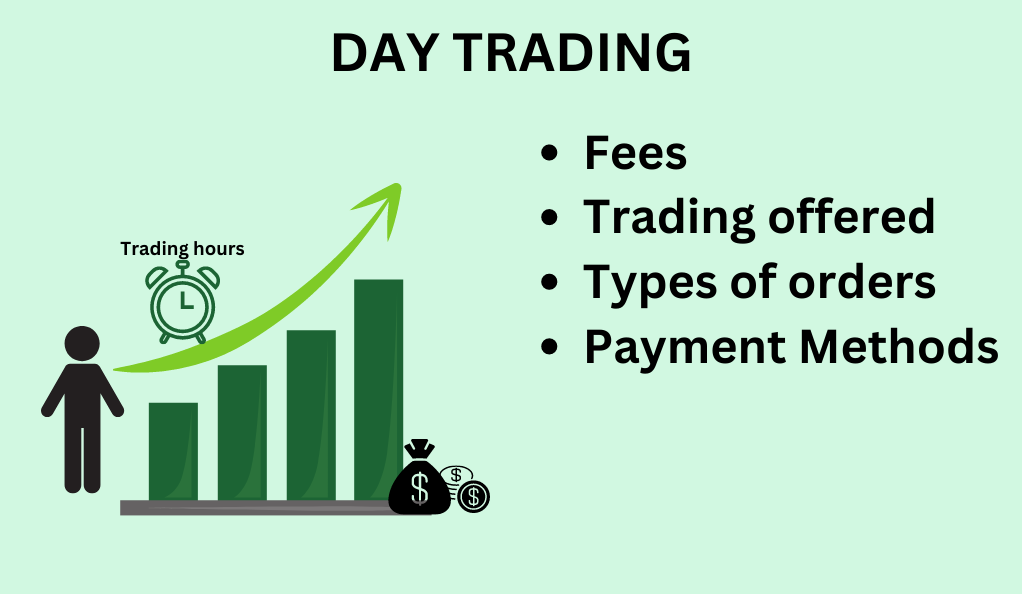
For this particular strategy, it is pivotal to consider fees, intuitiveness of the trading platforms offered, types of orders available, and also payment methods.
Our starting point is always regulation: we only take into account brokers that have the required licenses and are able to offer a secure environment to their customers.
Then, we consider fees, intuitiveness, types of orders and payment methods for the very characteristics of the day trading strategies.
Day trading involves taking fast decisions – here’s why intuitiveness is important, because the more intuitive the platform is, the faster the process of opening and closing positions. At the same time, since day traders tend to open several positions, the variety of financial instruments is important – so traders have more opportunities to filter the asset class and financial instrument they want to trade, also according to the different levels of volatility historically shown by different classes.
This also means that day traders should have the opportunity to automate their trading activity – and here the availability of different types of orders is pivotal.
Fees and commissions are as important as the other key elements we’ve listed so far: high fees and commissions can considerably impact the success of the strategy put in place by the trader. Moreover, a wide variety of payment methods allows the trader to choose the payment that better fits their strategies – both in terms of cost and transaction speed.
We considered all these elements before directly testing the online brokers we proposed in this article for day traders – but it’s also up to them to choose according to their particular needs.
What is Day Trading?
Day trading is a particular trading strategy that involves closing positions within the daily session.
So, this is a short-term trading strategy that requires considering some key actions taken by the trader.
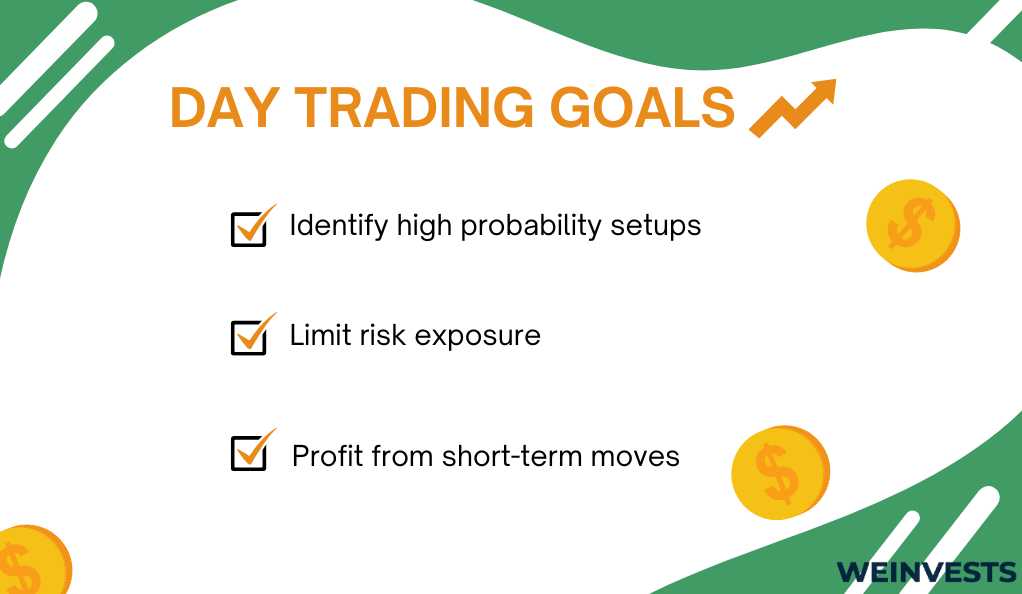
First off, the goal of day traders is usually to calculate possible profits on their overall activity – that is, they usually don’t aim at a few, big orders orders that might lead to relatively larger profits, like in the case of traders who prefer trend trading, but they open more positions that might lead to smaller profits.
Second, day traders want to avoid a particular risk called “overnight risk”: when markets are not so active, or when the trader can’t monitor the market – so, during the night usually – some unexpected issues may arise. For instance, a sudden piece of news that can affect market behaviors, or an unexpected change in a secondary trend.
To avoid this, day traders prefer to close a position while they’re still able to monitor it – so, before the daily session ends.
Moreover, day traders take into account the fact that brokers usually charge additional fees for overnight maintenance, and they want to avoid this cost.
Since day trading is time consuming and traders tend to open different positions, it is important for them to have tools that can allow them to automate their activity and manage risk: the use of orders like stop loss or take profit can be particularly useful in this sense, that’s why day traders tend to use online brokers that allow them to benefit from types of orders that make it possible for them to automatically close positions according to preset conditions.
Another key element is technical analysis: being more a speculative strategy than a real investment, day traders usually only rely on technical indicators and not on fundamental analysis of financial assets.
Day Trading with Crypto
For the very characteristics of day trading, day traders might prefer financial assets that tend to move faster.
Day trading a blue chip stock might result less suitable than trading a high cap crypto, since the latter usually results to be more volatile.
This can help day traders to open and close more positions on a short-term basis and see results – which, of course, can be negative or positive. While a relatively stable stock might not move during the day – especially when markets are in the accumulation or distribution phase.
Day Trading with CFD
For the reasons we listed above, day traders might tend to opt for assets that can allow them to maximize results.
In this sense, the fact that CFDs allow traders to use leverage might be helpful – but, of course, this is even riskier than the strategy itself.
Traders can get both profits or losses, so it is very important for aspiring day traders to have a deep understanding of markets and technical analysis, and to put in place risk management strategies.
Pros & Cons of Day Trading
- Day trading allows to avoid overnight risks
- It avoids overnight costs
- It is less exposed to macroeconomic factors and long-term risks
- Day trading is time consuming, since it requires continuous monitoring
- It’s a risky strategy
- It requires a deep understanding of technical analysis – this might prevent day trading from being the right fit for beginners
What day trading brokers charge the lowest fees?
Fees are an important aspect for day traders. Since they tend to be active traders and open several positions, high fees can heavily affect their capitals. Let’s see what are the fees charged by the brokers we listed.
- eToro – the broker offers most of its products with no direct costs for the final trader, but traders should take into account that the broker uses market spreads to be compensated. Moreover, eToro charges inactivity fees.
- Markets.com – Markets.com charges inactivity and overnight fees. It tends to keep costs low, but traders should accurately read the information related to each market.
- Interactive Brokers – this broker doesn’t charge inactivity fees, doesn’t require any minimum amount and has among the most competitive fees and commissions.
- AvaTrade – this broker does not charge any commission on CFD and crypto trading and spreads are tight. It charges high inactivity fees – but it’s something that usually doesn’t affect day traders, since they’re active traders. Moreover, it requires a minimum deposit that amounts to $100.
Summary
Day trading can be a useful strategy to avoid costs and risks related to overnight fees and market inactivity.
Despite this, it is still a risky strategy if we consider the number of positions opened by day traders, the fact that they need to spend more time monitoring markets, and that each position is subject to market risks.
Factors like fees, speed of transactions, intuitiveness of trading platforms and liquidity of markets should be taken into account accurately.
In this article, we listed the best brokers for day trading, but it’s up to the user to choose according to their financial needs and trading strategies.
FAQ
What are the key considerations when choosing a broker for day trading?
When choosing a broker for day trading, it’s important to consider factors such as fees, the intuitiveness of the trading platforms – since day trading requires fast decisions, the types of orders available – in order to partially automate day trading activity, and payment methods – instant deposit and withdrawals can favor day traders. Of course, the broker you choose should always be regulated.
What is day trading and what does it involve?
Day trading is a short-term trading strategy that involves closing positions within the daily session. Day traders tend to open several orders and to avoid “overnight risk” and additional fees for overnight maintenance. Day trading requires continuous monitoring, a deep understanding of technical analysis, and effective use of automation tools for trading activity and risk management.
What are the Pros and Cons of Day Trading?
Day trading offers advantages such as avoiding overnight risks and costs, and less exposure to macroeconomic factors and long-term risks. However, it is time-consuming due to the need for continuous market monitoring. It’s also a risky strategy that requires a deep understanding of technical analysis – which might not be the right fit for beginners.
WeInvests is a financial portal-based research agency. We do our utmost best to offer reliable and unbiased information about crypto, finance, trading and stocks. However, we do not offer financial advice and users should always carry out their own research.
Read More




